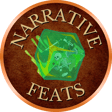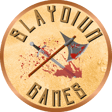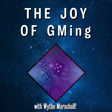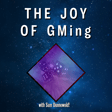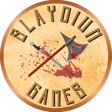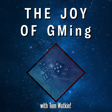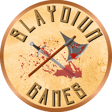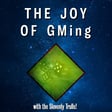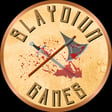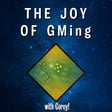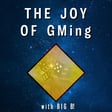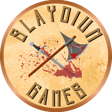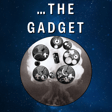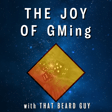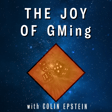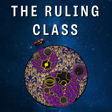Become a Creator today!Start creating today - Share your story with the world!
Start for free
00:00:00
00:00:01

The Joy of GMing - with Special Guest Brand Osorio
This sister-series to Anywhere But Now— our Doctor Who Actual Play Podcast — will be released between Mods or episodes with our ongoing, serialized show. We’ll cover some making-of and behind the scenes tidbits of our latest mod as well, so do stick around.
Our special guest today is Brand Osorio with host Casey Jones!
Music by Tabletop Audio
Theme by RJ Pirchinello
Be sure to subscribe and leave a comment, and follow us on Twitter for more updates. Come say hi! If you enjoy the ep, share it with your friends! If you don't, share it with your enemies!
Transcript
Introduction to the Joy of GMing
00:00:13
Speaker
you
00:00:34
Speaker
Whether you're at a game table, in your comfiest chair reading a book, or listening at home, there's nothing like a great adventure story. But they don't happen by accident.
00:00:44
Speaker
Welcome to the joy of GMing, a special interview series on the craft of great gaming. There's just something magic about sitting down to a good table with great friends, isn't there?
Guest Speakers & Game Design Tips
00:00:54
Speaker
If you're a lifelong gamer or a newbie rolling up your first character sheet, if you're a DM or a GM or just can't get enough tabletop talk in your day, this is the show for you.
00:01:05
Speaker
Each episode will bring you amazing guest speakers to talk about writing games and running them, building fantastic worlds and compelling story arcs, and oh so useful tricks of the trade. Here's some amazing stories, get inspired for your next game, and join us for an hour or so of lively conversation.
00:01:24
Speaker
I'm Casey Jones, writer and voice actor. Over the last dozen years, I've written and produced screenplays, children's animation for TV and film, graphic novels, stage plays, murder mysteries, and audio adventures. I've also been writing and running tabletop games for over 10 years.
00:01:41
Speaker
Join me as we dive deep into the wellspring of creativity with fellow experts in making stuff up. This sister series to Anywhere But Now, our Doctor Who actual play podcast, will be released between mods or episodes with our ongoing serialized show. We'll cover some making of and behind the scenes tidbits of our latest mod as well, so do stick
Interview with Brand Osorio
00:02:02
Speaker
around. And now, to introduce our special guest today, Brand Osorio. Brand is best known as BG Osorio, the author and game designer
00:02:10
Speaker
who created the Dark Refuge TTRPG, the Outlaw's Guide to Refuge, and the Earth Expeditionary Force, or EEF for short. Dark Refuge helped move the gaming industry away from fancy and magic systems, and there'll be more on that later. Brand has run online campaigns involving hundreds of gaming groups across the US, and has been a special guest speaker at colleges on the topics of independent game design, guerrilla marketing,
00:02:36
Speaker
and the art of creating compelling villains. In 2012, Brand released the tabletop game Time Shredders, a time travel slash history game using a revolutionary playing card system, and later on, the Seas of Kansas, a modern day campaign with adventures tackling real world challenges like flooding and white supremacy, which was released through Wisdom Vault and Metagame earlier this year in 2023. He's also a stage and voice actor, and the mind behind our very own Fixer on Anywhere But Now.
00:03:06
Speaker
Brand, welcome. So, Brand, can you tell us how you got started writing for games? Was there a catalyst that sparked your imagination in the first place? Well, there were a couple, actually. I have to say, one of the most turning point moments in my design career was actually when I was attending college. I was trying to expand the various type of course loads I was taking and I took on a mythology course. Nice.
00:03:32
Speaker
I had always been fascinated with mythology. I had studied it for years. I had loved Bulfinch's mythology when I was a wee kid and then started working my way around the world trying to learn different cultures and the way that they tell stories. And it was hysterical in that I didn't expect this to happen during the class, but I guess I should have.
00:03:53
Speaker
Our teacher set at one of the final projects that we would actually just come up with our own mythology. And I spent about two months putting together a fairly comprehensive dimensional guide with different species and biomes that would inhabit all these different dimensions.
00:04:12
Speaker
I tried to use this as my starting point, very familiar concepts, and then take them in directions other authors at the time just simply weren't taking them.
Dark Refuge Game Development
00:04:20
Speaker
And I mean, I might date myself by saying this, but if you guys remember those old black and white notebooks.
00:04:29
Speaker
filled cover to cover with just this very intricate mythology, this multi-millennial long fight between these different species, some working towards trying to help other species, some simply being driven by very core biological drives, but in so doing lead them to some fairly significant violence and danger and threat to other species.
00:04:54
Speaker
When I finished the project, I had a bunch of friends that I really love who were part of my gaming group. We had gone through a couple of different game systems at the time. A couple of years before, I had been working on a ruleset and I'd never quite found a place to put it.
00:05:11
Speaker
But now I think I finally had that universe to set it in and I really wanted to test it and see if it would work. It was really just going to be something fun to see if it worked as a concept. And we ended up playing that for about about two years.
00:05:27
Speaker
Wow. And at the end of that, one of the players actually came up for the name for the game, which was wonderful. They used the world name refuge and then added in a line that to this day, I think really expresses how much of an edgelord I was back in the day. Oh, well, you've got to call it dark refuge because you're a dark and foreboding God, which now I look back and I cringe when I think about that. But at the time, it was hysterical to me.
00:05:54
Speaker
I have to admit dark refuge sells an entirely different vibe than refuge. Like refuge could be anything refuge could be nice dark refuge that immediately tells me something specific about it which is which is very sharp I take that a lot.
00:06:10
Speaker
Oh, thank you. I wanted it to be, much like our own world, a world that you would arrive at and feel like you could understand the concepts of what was going on very easily, and yet at the same time, the only reason the world was quite as horrifying as you as a player experienced it was because of the specific decisions that people had made.
00:06:31
Speaker
personally driven decisions, in some cases based on their faiths, in some cases based on their desire for certain access to certain resources. But in general, it was a world that was designed to show people that we have so much more resource available to us than we maybe realize at times. And that if we all came together and worked together, we could actually achieve these really amazing things. But we first got to be aware that there are other people out there who are operating under a slightly different set of rules than we
00:07:00
Speaker
That's very well put. Yeah, if you're going to sit down at a table with someone you don't necessarily know very well, it helps if you're all playing by the same rules. Absolutely. You know, in the earlier products, I spent more time doing lore development, rule development, trying to create magic systems that would allow players to not just have a really comprehensive set of things they could do that made them feel empowered, but
00:07:25
Speaker
also be able to create stuff new in-game that would not just affect their game, but affect that convention game, future convention games, change the lore in meaningful ways, and then try to keep track of that data as multiple conventions happen. So that way, as new campaign books come out, all of that player-driven change in the world meaningfully happens for everything.
00:07:48
Speaker
That's really cool. Can you expand on how choices a player makes in game 14 affects the next publication, or the next set of the rules, or the backstory for the campaign to follow? Can you expand on that? Absolutely. I actually have a perfect example of it. So when I was first writing the Dark Refuge lore, the planet refuge itself was supposed to be a prison planet that the inhabitants didn't know was a prison planet.
00:08:15
Speaker
Many of the species on it weren't there as prisoners. They were just either naturally occurring or had come from other places. Specifically humans were using it as a prison plan. Because of that concept, there were certain rules in place in the lore that were explained in the EF guide that certain players just, you know, never read or never really cared about because they're like, well, you know, I'm a street level hero in this place. I don't really care about that. And as we started our border wars campaign, which was the first of our campaign to involve
00:08:42
Speaker
multiple groups around the country, all submitting stuff at once. Wow. We would have these Keystone events at some of the conventions that had always done right by us and always created inclusive environments. That's great. So throughout the year, we'd have these Keystone events. And one of those Keystone events was at Geneseo University for their Running Gag event. It was such a fun time. But in the middle of one of them, a player decided he was going to use a technomantic ability
00:09:09
Speaker
to control microscopic robots called nanites and use them to
Player Influence in Dark Refuge
00:09:13
Speaker
assemble a rocket ship on the fly.
00:09:16
Speaker
not understanding why no one seemed to have space travel on this planet. So he assembles this rocket ship, proceeds to then sell this technology and a magnetic launching system to the nearby slave lords, thinking he's like ahead of the curve. Oh no. As they all begin launching these missiles in game that he has given them, they are a suborbital weapon. Sorry, they're an orbital weapon. So they go up into orbit and then come back down at a different location.
00:09:45
Speaker
Which immediately breaks those rules for a prison planet, right? Like if I tell you it's a prison planet, it makes sense. They're not going to allow the prisoners to have anything that goes up into orbit like that. So suddenly it triggers something in the EF guide that we had released like literally eight years earlier at that point. Which says if anybody in-game at one of these events.
00:10:03
Speaker
does this action of going orbital. That will instantly result in the Iron Republic, this corporate totalitarian regime coming down and trying to suppress the prison rebellion. However, the players were super creative. They spent the rest of that weekend and the next four Keystone Events at different conventions around the country working with different groups together to make sure players would be on site to be able to like, can we do this thing to offset this? Can we do this thing to offset that? We'll be ready for them when they come down and their rockets
00:10:32
Speaker
Exactly. They actually weren't. They were ready for a full orbital invasion. They were ready for orbital bombardment. They were ready for nuclear attack. I was impressed by the creativeness of all these different groups working in tandem.
00:10:45
Speaker
But it wouldn't have happened if that one player wouldn't have been like, hey, I'm getting ahead of the curve. I'm going to make money on selling weapons to both sides. This is going to be great. Let's escalate this war. You said the magic word escalation. This is one of my favorite things about being a GM. Like when you.
00:11:04
Speaker
get chemistry with your table and you start to see and anticipate the choices they're gonna make and how they respond to a shove in one direction or the other and then they push back and they push back a little harder and you're like, ooh, ooh, I wasn't expecting that. Yes, what happens if I escalate even more? What if I bring on a stronger enemy? What if it comes from orbit?
00:11:26
Speaker
And their resourcefulness and their creativity is forced to leap to new places that are completely outside of the box of what they've done before. And the fact that you are doing this on a scale, a nationally wide scale, is so impressive. That is so beautiful. And I think also says something to the solidarity of gamers. If they can get behind an interesting challenge, they can all agree on and point themselves in the same direction.
00:11:56
Speaker
Even if it's against the GM, that's a thing of beauty. And that was one of the really fun parts about it. Yes, there was an element of me also raising the stakes as they raised the stakes. But once we finished up the border wars campaign, we originally had a Lost Colonies campaign we were going to go into.
00:12:14
Speaker
And we actually sidestepped instead into an expanded Dark Refuge space campaign just to accommodate the fact that so many players had done these actions that would have a galactic import. They had sent out species that had very rapid growth rates onto planets that they had never been to before. They were actively disrupting intergalactic trade.
00:12:36
Speaker
We opened it up to them as the best of players from the border wars were now allowed to take part in the first of three space campaigns. Wow. We didn't plan on making three of them, but we ended up getting enough player interests that we ended up doing three of these for groups again, all over the US, all contributing at the same time.
00:12:55
Speaker
There was a moment where I was literally like abroad doing my day job in another country and I'm responding online to like the teammate who's doing the IT work on the back end just to make sure we can accommodate the players new requests and the new players that they want to bring in to incorporate into their factions. It was such a fulfilling moment.
00:13:17
Speaker
That's just incredible.
Magic Systems in RPGs
00:13:18
Speaker
I am humbled to be sitting over Zoom, essentially, your telepresence, haha, because to hear you talk about this, like, not only like the proud papa of the gamers, like, look what they did! They built armies, they joined forces, and they fought the nuclear weapons raining down from on high. Those little go-getters!
00:13:42
Speaker
But also the fact that you were able to say, okay, well the next tier of this is going to be available for the most resourceful and the most collaborative of the players and like, oh no, our cup runneth over, we've got to triple this.
00:13:57
Speaker
to run three of them so that everybody that wants to and is ready for it can take part. That is so awesome of you. That's wonderful. How you were able to get the best out of your players by challenging and inspiring them
00:14:14
Speaker
to tackling new challenges on higher tiers of difficulty and engagement with each other while still operating in the realm of cause and effect where the things they have done brought them to this point and impacted the world they're stepping into and not just walking in cold
00:14:31
Speaker
unfamiliar with the way things have changed because of the stuff they've done and that reminds me of what you were mentioning when you shared your bio about how the work you had been doing with these games changed fancy and magic systems and breaking its hold on the gaming industry and I would love to hear more about that if you could explain for our listeners what fancy and magic systems are
00:14:59
Speaker
and how it had a hold on things and how that has changed with the games that you've released. Absolutely. What are called Vancian magic systems, I always forget the author's first name but his last name was Vance, and he wrote a series called the Dying Earth series. It posited the idea that the reason magic isn't around anymore.
00:15:18
Speaker
isn't that it's not there, it's that the process involved is very specific. And not only is it specific, it requires you to, and you see this a lot in Dungeons and Dragons inspired products, memorize spells. Now why Vance had that idea was, the idea was you had to intake this magical information into your brain, and then in the act of releasing the magical information, it burns itself clean from your memory, which explains why everyone can't just do magic all the time. For his series, made a lot of sense.
00:15:48
Speaker
Sure. But because it was so influential on the creators of Dungeons & Dragons and the way they imagined magic to play out in a wargaming setting, which let's be honest, that's what D&D started as, or at least the precursors of it started as, they needed to limit how powerful wizards were while still making magic users feel
00:16:09
Speaker
powerful. So you could do one or two spells that were incredibly powerful, if you got a high enough level, and a whole bunch of spells that could do a bunch of things if you were very creative. But the common complaint at the time, and as somebody who grew up on second edition D&D, I experienced it over and over again, was this feeling like
00:16:27
Speaker
How can I learn something and know something and feel it's part of my being and then when I do it, I can't do it anymore? Nothing else humans do works that way. When we better ourselves, when we learn new skills, we're able to not just build new neurons, but we're connecting new ideas. We look at the world in a better way as we learn new skills and learn more about our environment. Hopefully. Hopefully, hopefully.
00:16:51
Speaker
That's fair. That was the core of why I wanted to change the way we were looking at magic and the way we're interacting with magic. I also wanted magic to not be something that was a scam being played by tricksters. Can you expand on that? Absolutely. Like, I love illusion. Illusionists is really awesome. Great shows. They can be very entertaining. But to me, that's not quite what I imagined as a child as magic.
00:17:19
Speaker
I liked it the minute I understood the concept, and I can't remember if it was Asimov or Klorko who came up with the idea that any sufficiently advanced form of technology will appear like magic to those who are initiated.
00:17:35
Speaker
Clarksville, there we go, thank you. And I looked at that and said, how can I build a magic system that works the way we learn things normally, but feels more like that. Like it's just we haven't understood the radiations we're dealing with yet. It's not that the laws of science don't apply, it's that when you're doing this thing that seems so easy because no one sees what's happening on the back end,
00:17:55
Speaker
You're actually drawing this radiation from one dimension. You're using it to power the propulsion, fulfilling all the needs of physics flight. And that's why you rise up into the air and fly. And once you've learned to do that, as long as you keep your concentration, as long as you aren't completely distracted by the things around you, you should kind of be able to do that most of the time, right? Most of the time, yeah. Most of the time.
00:18:19
Speaker
I built a system that at the time I was building to be a universal system. It was a D6 dice pull system, specifically to just handle magic. And that was what I called the Leia's system. There was nothing quite like it at the time. You know, you had either the Vancien systems of Dungeons and Dragons, or you had this sort of make it up as you go along system that White Wolf had in their Mage the Ascension series. But there was never that feeling of
00:18:44
Speaker
direct spell progression and the ability to combine magic on the fly to create the effects you want. Built into that and this idea of it being more a fact of nature, a science you can understand with enough technology rather than just something that is random. I wanted to have a driving factor be the human mind because what we do in role-playing is so driven by the human
Empowering Players in Role-Playing
00:19:08
Speaker
mind. It's the art of the mind's eye when we do it right. Absolutely.
00:19:11
Speaker
One thing I want to give you credit for, Casey, you're amazing at that. You've empowered the players so much and you create an environment that does feel like one that you can figure out problems in a meaningful way and find solutions. And you don't ever feel like you have to sort of just like find the right answer. You can find many answers. And I really like that. Thank you. That is part of, in my opinion, the very DNA
00:19:38
Speaker
of both Doctor Who, but also these specific kind of games that I enjoy running so much. And tip my hat to you makes you one of the most interesting players to watch in that environment because whatever evil plan the baddie has, whether it's an episode of Doctor Who or a good game of Doctor Who, the seeds of their downfall are baked right into
00:20:06
Speaker
the plan they are already making so that you can hoist them by their own petard, so that you can turn their forces against them, so that something they've overlooked can be used to turn the tables on them and surprise them
00:20:23
Speaker
And surprising the villains, a lot of the time means surprising the GM, which is absolutely wonderful. And on that subject, I think it comes down to the world building, because it's not just, oh, they've got a death ray. You know, it's like, no, they have a death ray that's powered by moon rocks that they dug up in the Sea of Tranquility in the month of March when there was an eclipse, you know. And when you get to the environment,
00:20:46
Speaker
This is audio, and one of the things I love so much about the medium is that with just a few choice words about the smells that hit your nostrils as you walk in the room and the temperature of the air and how the echoes fade as you get further and further into the shadows.
00:21:05
Speaker
we build anticipation, we establish a scene, and the listener is automatically tuned to paying attention. When you're paying attention and picking out little details of, oh, there's a lamp on the wall, let me turn that up and see if I get a better look at the mirror monsters down the way. Oh,
00:21:23
Speaker
We're on an ocean planet next week. Let's see what we have here. I'm reminded of the Princess Bride, where Fezzik and the freshly reinvigorated dread pilot Wesley is like, well, what do we have? What are our advantages? What are our resources? And it's like, well, I've got this apocalypse cloak. It's like, that's great. But if we had a wheelbarrow, that would really be something. And Fezzik is like, oh, the wheelbarrow is over there. He's like, why didn't you mention that when we were talking about our resources? And
00:21:53
Speaker
It's such a great scene. It's such a great movie. And a book. Amazing book, too. And I think it also helps illustrate one of the things that you do incredibly well, which is make these worlds feel lived in. They don't feel empty. They don't feel like you have to scour it to find interaction. Instead, every way you turn, there is something that has meaning or something that at minimum can be used to benefit the group and drive the story forward.
00:22:21
Speaker
And I think that's not just an amazing skill you have, but also an incredible talent. So I want to give mad props to that. Thank you very much. Part of that is very deliberate. We have on our team an intrepid investigator. We have on our team a resourceful problem solver. We will eventually have on our team, starting with the next mod, a lovely dollop of chaos that goes where the wind blows them and she is a miracle on two feet.
00:22:50
Speaker
I will say straight up that the Fixer would not be alive in later episodes if it were not for the amazingly heroic actions of Calamity Hat. I hope that's not a spoiler. I mean, it might as well be a teaser at this point. Part of my job as the GM setting up the bones of the story that we're going to be telling collaboratively is making sure that for a problem solver and an investigator and a dollop of KS, they all have
00:23:15
Speaker
things to do or people to talk to, mystery clues that just tug at their curiosity, that little bit. You just start putting them together and raise the baton and before you know it, you're making music. Absolutely. You know, it's interesting because we're talking about the joys of GMing and that is both one of the joys and also one of the real challenges a lot of new narrators and GMs deal with.
00:23:39
Speaker
When you feel like you're dropping meaningful clues that should pique the player's interest either because they had a tough day at work or because they just heard it a different way, they don't pick up on the exact clue that you got, you're trying to give them, what type of tools do you use to sort of get them back on focus or to really emphasize like this clue has value, this clue, yeah you could red herring it for a while but
00:24:02
Speaker
See, this is where it gets really interesting because over the course of Through the Looking Glass, there are a ton of breadcrumbs and little clues that get completely ignored. Maeve declines getting on the wagon and riding to Bishop Rock with her friend Mitchell and skips a ticket right to the boss fight.
00:24:26
Speaker
And the way I get her to lose interest in that is by telling her she has to go. Bless her. It worked out beautifully. Maeve turned her nose up of like, I'm investigating missing people and you've got lighthouse renovations? Come on. And still it gets mentioned that off he goes to Bishop Rock. That's fine.
00:24:44
Speaker
But there are a number of ways to help GMs and DMs feed those little clues in, and one of the most useful ways is to multiply them. There are great articles online about the Rule of Three. Any important bit of information you want your players to discover should be findable in at least three different ways.
00:25:06
Speaker
whether it's talking to someone who was there, investigating clues on the scene, noticing differences in the texture and the details just in the opening narration that'll get filed away, whether or not they're writing it down, and then when it comes back a second later, it's like, wait, did that shadow move?
00:25:24
Speaker
Yeah. So with something like Through the Looking Glass, these monsters, their ability is predicated on light because mirrors are worthless in the dark. And I thought that was an interesting distinction to make from the boneless, the CGI flattened monsters of Capaldi's era of who? I was actually really pleased by a lot of these deep cut slash slightly varied
00:25:49
Speaker
forms on a theme that you've been going for. You get these wonderful connections back to old Hulor, but at the same time, when you start dropping the hints, you allow it to be just, and I don't mean scattershot in a bad way, I mean scattershot in a good way, just enough. So when we look at the picture, we go, oh wait, could this be this other thing? Could this be the boneless we're facing? Oh no, this could be this thing. And then we could make really dangerous decisions based on the way our character might jump thinking, oh, it's this threat or that threat.
00:26:18
Speaker
I actually tried to have a little fun with that in one of the later episodes. We can't wait to find out about it. But yes, so Maeve comes down the stairs to this darkened bar where they keep the windows kind of grotty to begin with. The curtains are closed so it's dark. There are mirrors in here and nothing's wrong. Then you cut to across the street where it's bright and cheery at the Darling Bakery and the second someone touches one of the mirrors they cry out in pain and surprise.
00:26:45
Speaker
And then you creep your way through the storage facility above Vanity Glass where once again it is dark. And by that point Maeve has started to hear enough distinctions of like these things are a lot more dangerous where there's light. And so by the time you reach the lighthouse and the claw reaching out in haphazard chaos, everything has been predicated on, nothing feels unfair. And when Maeve has the idea of the light, we need to shut off the light. Not only did she cut the
00:27:14
Speaker
boss battle right in the bud which was just beautiful to watch but we get to use the mechanics of 1890 and put you in a lighthouse on an actual island outside of Cornwall. And we felt like we were in it in that moment.
00:27:32
Speaker
On top of that, I think it's also a great lesson for new GMs in that you may think that the boss battle, the set piece moment is the most important moment because it's the thing that you feel ties the story together. I know this feeling too. When I first started doing some of the college lectures, I actually put together a way of thinking about this to help new GMs. And the way to think about it as a new GM is create your set piece, create them in the way that you want them in your mind, but don't set them at a specific point in the story.
00:28:02
Speaker
just allow them to free float in your mind. And if the players go in a direction that really links into that, absolutely, pull it into play, have all of those ideas play out. But if they don't...
00:28:14
Speaker
That's okay. It allows you to take the story in ways you didn't expect. And you can then revisit the scene that you had created, that set piece idea and say, what in this set piece idea speaks to me? What is the element of it that I really wanna present? And is it something that might be more meaningful with a different scenario playing out in a future event? And so by having these mobile pieces that you can pull into play when you need them,
00:28:39
Speaker
You have an expanded toolbox as opposed to a railroad. Yes. God knows there have been enough jokes about me and railroading on games with a name like Casey Jones. Put that together. That's that's good. Deep cuts. I like that.
Guiding Players in Storytelling
00:28:57
Speaker
But to go to circle back to your question and don't worry, we will be touching on your national campaigns and your guest speaking very shortly.
00:29:06
Speaker
But to answer your question about how do you nudge the characters in a way that you want them to go, I think it comes down, at least in parts, to two things. Number one, and you already touched on this, don't set things in stone. Set things out, lay the table.
00:29:22
Speaker
and then say, okay, here you are, feel free to explore. My job is to figure out what will happen if the heroes do nothing or do things that's inadvertently help the bad guy. And the second thing that helps just tug things in one direction or another are prompts and cues from NPCs, whether someone's
00:29:45
Speaker
calendar reminder goes off it's like oh I have to go make sure that so-and-so remember to eat today or like you're not allowed in here you don't get to be in here those kinds of pushes and pulls not only informs okay this is what I can start to expect from the players the next time around if I want so-and-so to do something I just had to tell them not to do it
00:30:07
Speaker
Or they may refuse the bait. They're like, no, no, let them go. We're investigating here. And I'm like, okay, let's really deep dive into what you can find in this office as you're scrolling through paperwork and make sure there's something in the paperwork to find, you know? Yes. That leaves
00:30:22
Speaker
to things later on. And I think you said something brilliant about how early GMs can put way too much focus on the climax. Because that's the most important thing. I could not disagree more. Because beating, quote unquote, defeating the mirror monster at the end of Through the Looking Glass is not the point. The point is building a relationship with your new companion.
00:30:43
Speaker
and finding out that there are other time travelers out there deliberately making chaotic decisions that you are gonna have to clean up. Those things, those are threads that will connect to ongoing stories. And the fact that Maeve was able to help the fixer depower the mirror monsters and safely get them out of 1890
00:31:05
Speaker
That will impact things and that will lead to braver decisions and stronger choices, but it has absolutely nothing to do with where in the chain of events they stopped a big glowy arm from scraping around and terrorizing a small lighthouse. And now, a word from today's sponsor.
00:31:34
Speaker
I do want to circle back. You have run campaigns across hundreds of gaming groups, and you've also been a guest speaker in college lectures on topics like world building, and the art of guerrilla marketing, and the crafting of great villains. I would love to hear what that's been like for you.
00:31:53
Speaker
Absolutely. I find that I was really lucky to be coming up when I was. It was right at the beginning of things like Facebook and Twitter and a lot of these social medias that are now sort of like stayed and older. So I had access to a lot of tools that were just sort of burgeoning. I mean, it was so long ago that literally MySpace was a thing. What is the MySpace? It is in the long ago. Pay it no heed.
00:32:18
Speaker
There were all these new tools which made my experience really good. I was learning these new tools at the same time everybody else was learning these new tools for the first time. There was the ability at that time also to drive traffic to websites in a way that simply doesn't happen anymore.
00:32:34
Speaker
So we were able to maintain a dark refuge website for many many years that had a bunch of player-made forums attached to it as well. And those player-made forums, I think some of them are even located in places like France, have these just troves of
00:32:52
Speaker
content that we created as groups and creating that content as a group allowed us to then have people in the colleges that we wanted to expand our influence in who were already playing the games because they were literally the students there. It was a wonderful event.
00:33:10
Speaker
And so then when I was going down to do these lectures, I started realizing quite how different the industry was for so many people who experienced it at the time. There was a feeling of a monolith, basically.
00:33:26
Speaker
D&D, which had just been bought by Watsy. And there was this idea that third edition was going to be this brand new, incredible thing. But at the same time, there was this backlash from the people who had worked on second edition. You had World of Darkness that had just sort of come to a close with a lot of its products at that point. It hadn't yet launched the next phase. And so I had the pleasure of being on these panels.
00:33:51
Speaker
and being at lectures where I was a guest speaker alongside people who had worked at TSR for years. I had the pleasure of interacting with wonderful people like Frank Meltzer and quite a few others who had been part of the original D&D team.
00:34:06
Speaker
I had the joys of actually being able to have some of my team members at some of these events run games for some of these originals. And getting their feedback was so beautiful because there I am, sort of a special guest for the generation at that time.
00:34:21
Speaker
Whereas I'm looking up to these guys, incredibly excited to get any feedback they can give me and any great ideas they want to share. One of my proudest moments was actually I had a GM who was working for me, great guy by the name of Adam. He's running our events while I'm doing one of the lecture series. And I'm on the stage with Denise Crosby from Star Trek who played Tasha Yar.
00:34:46
Speaker
And I am fanboying so hard. I'm trying to hold it together because we're literally on a stage. It's at Stony Brook University. It is filled with people. I have directors on one side of me. I have producers on the other side of me. The majority of the people on that panel where they're actually promoting that season of Dexter.
00:35:03
Speaker
And I was lucky enough to be chosen to also speak for TTRPGs on this panel. It was an incredible experience. And so I'm fanboying over being next to OG Star Trek, you know, and she was a mate. Well, TNG Star Trek to be technical. Sorry, TNG. You're absolutely right. And I come back to the table and I see that Frank has been playing my game
00:35:24
Speaker
with Adam running it and we have a whole table of people there enjoying it. We have our other GMs running on the tables. And I walk over and I'm like, I don't know what to do. I don't know what to say. And he just sort of gets up and walks over and says, that was the best game I played all convention. I really want to thank you. I literally, I just. My jaw is on the floor. I was like, thank you, sir.
00:35:45
Speaker
Just one of those amazing moments that conventions create, that colleges create when they support fiction writers. You know, I've had the pleasure of going to a bunch of different universities and doing lectures every time.
00:36:01
Speaker
when I get to see those moments when something I've developed in the TTRPG industry helps somebody who's just getting into writing start getting their creative juices flowing and you see that moment where they start writing in their notebook or at the time or like pulling out their pad and like making notes massively and at the end of it they come up they're like thank you so much I now know how I'm gonna like release my book or now I know how I'm gonna
00:36:24
Speaker
create this game that I've been thinking about for years. I had that happen at East Coast Gaming Expo just this last year during the summer. We were running a really fun how to create games session, and we had a full group of people who had all come in majority-wise to learn about that.
00:36:44
Speaker
And there was maybe two people in there in the back who had come in because like a friend had dragged them in. And one of those two people at the end of the thing came up to me after a whole bunch of people had given me some really wonderful praise about the session. But their praise stood out more than anything else to me because they said, you know,
00:36:59
Speaker
I never thought I could create something like that.
Inspiring New Game Designers
00:37:02
Speaker
I didn't think that my brain worked in a way that would allow me to do that. And now you've given me these tools and I feel like I can now. Like, not just that I can, like I'm going home this weekend and I'm literally, and she lays out this amazing plan for this game she wants to build, which I am so happy. I hope she's building it right now. And hopefully, you know, some future thing I'll be able to tell people. This gal from this event was part of this great thing.
00:37:27
Speaker
I do so and so before they launched the thousand games of Blotty Blot, yeah. I have had that experience before too. I had the pleasure of running a bunch of games back in the day for a designer, a young designer by the name of Nick Butler. Nick Butler released a amazing game called Tide Breaker. Nice. And he ended up clearing
00:37:50
Speaker
over 50,000 on Kickstarter, on Tide Breaker, and rightfully so. The product is amazing. It's a great product, great art, really meaningful social messages in it. It creates an inclusive environment. I am incredibly proud of him. He's a great designer, and I'm just so happy that, again, we had a great interaction back in the day. He felt like this is something now he can do, and he did it, and he kicked so much butt. I mean, ah, I'm so proud.
00:38:17
Speaker
That is the wonderful thing about the cross-pollination of creativity. You know, you go to one game night, you give one lecture, suddenly you change someone's whole world by, I didn't realize that was possible. I did not know that was a thing you could do. I can do that as well. It's beautiful to see, to see the light go on.
00:38:41
Speaker
That's actually been one of my biggest joys being in this industry for the last 20 years. We went from an industry that was four or five companies really duking it out for supremacy to an industry where there are hundreds of amazing independent creators. Hundreds of different ways to understand and experience gaming.
00:39:01
Speaker
You know, I really enjoy the Doctor Who system that the cubicle seven has come out with. I love the fact that it encourages us to find heroic solutions that don't involve us having to just fight our way through. I love watching podcasts like Dimension 20 and watching half a dozen people who know D&D inside and out go to a campaign.
00:39:22
Speaker
and spend an hour and a half running a battle scene that probably unfolded over maybe five minutes. With the right group, it's wonderful to watch. The combat elements of it have never been my personal favorite. I'm not necessarily a very physically strong person, and fighting has never been something that appealed to me personally.
00:39:44
Speaker
I'm not gonna yuck anybody's yum. If that is what brings you joy at the table, I want you to have fun doing that. For my tables, it is closer to, okay, here are some baddies. Here are the things they are trying to do. They are stronger than you. They are tougher than you. They have been here long enough to build the evil plan. You are not necessarily the strongest character on the table.
00:40:07
Speaker
you do not necessarily have a blaster gun in your hand. And the game itself is set up to punish you if you shoot first and ask questions later. I have docked story points from PCs
Inclusivity & Boundaries in Gaming
00:40:20
Speaker
in the past if they jump into a situation, don't listen to anybody,
00:40:24
Speaker
and then just try to strike out on their own to solve it by themselves and nearly get themselves killed in the immediate after effects. You know, afterwards, maybe just Nudge was like, you know, this game really does flow more easily when people are focused on teamwork as part of the vibe of the show, the vibe of the game. We want it to be thematically consistent.
00:40:46
Speaker
No, no, that was a perfect way to describe it because that's exactly the dynamic we're looking for. You know, we've had a lot of people who have given us some feedback that their experience of it has been like experiencing a Doctor Who show. We care about the creatures we're interacting with. We're trying to make the universe better as we go through it. We're not just trying to be the biggest baddie in the room. We're trying to make everybody better in the room.
00:41:09
Speaker
By trying to say that, no, there's actually room for everybody here, except the Daleks. The Daleks can go screw. We don't need fascists at our table. Exactly right. I think that's an important point to make also for a new GM. You're going to have a lot of different groups that you'll run for. You'll have different friend groups, different social groups. You'll run into a lot of different types of players with a lot of different types of backgrounds.
00:41:32
Speaker
And they're gonna wanna do different things at the same table. The Fixer might be focused on, well, what can I repair here? Who needs help? And right next to you at the same table, Maeve is like, where is the mystery? What is the truth I get to uncover today? And at the same table is Calamity Hap. Just looking at the sky and wondering what sort of chaos is gonna come raining down on her today.
00:41:55
Speaker
because she brought an umbrella. You can make them all synchronize and build beautiful synthesis of them coming together and working together and still defeating the bad guys, rescuing the people that are still alive and flying off in your fantastic flying machine to another locale and time and space, you know? And it's a beautiful dynamic.
00:42:16
Speaker
But I think you made a good point earlier when you brought up the idea that with those types of, we want to include everybody. For new GMs, you want to include everybody, but do keep a fine line when it comes to people who are spreading hate, people who are fascist, people who are trying to harm others, because I've seen it play out where you try to do your best to include those people, and they will inevitably hurt people at the table around you, and you got to decide, do you want to keep the players at the table safe?
00:42:43
Speaker
Or do you want to just simply allow them to do their thing? And I find that it's better to keep the players at the table safe. Yeah, no. Firm boundaries of what is and is not appropriate are great, which is one of the reasons I'm so grateful for the Lines and Vails system.
00:43:01
Speaker
of being able to check in with our players in the creation steps. What are you comfortable with? What makes you a little hesitant? What do you not want to see in any way, shape, or form at the table? Those aren't difficult to find. Those aren't difficult to use. I know that you have had your own challenges.
00:43:19
Speaker
working with Wisdom Vault and Metagame to release your games like Time Shredders and The Seas of Kansas. What were some of the obstacles to making those games happen since the world has gotten smaller and bigger in the last 10 years? Oh, absolutely. I'm proudly LGBTQ+. Holla. Heck yeah. People considered me non-binary before there was a term for it. And so it was interesting sort of growing up into a world where people are now finally accepting of that.
00:43:49
Speaker
Which is really cool. I really like that. It's a lot nicer now in that regard. But there definitely were times over the course of my career where I was at certain colleges in the middle of certain know-wares, if you know what I mean, where people definitely treated me very poorly for being different, talked about me in horrible ways. And I think that's one of the most painful parts when you really are trying to create products that have a positive outlook, a positive impact.
00:44:14
Speaker
At the time I was creating products that would be openly advertised as PG-13 and higher. They would not be for little kids and we wouldn't allow little kids at our table. So it was very upsetting to me that for some reason parents were fine with the battle scenes I would narrate that involved people getting their arms lopped off and deep, deep
00:44:34
Speaker
levels of violence, which was a part of the original Dark Refuge game. It was very much a product of its time. It was high brutality, and death was transitory, so you were encouraged sometimes to find the quicker answer if it meant you could save a bunch of lives. They would be fine with that. But then they would find out that I am bisexual, pansexual, and even though that wasn't a thing that was coming up in-game,
00:44:57
Speaker
If someone mentioned that, there would be this attitude of, well, that's not somebody who should be allowed to run games. And it's like, what do you mean? Why? Why? Why? Because I have a lot of love in my heart for a lot of different types of people that are all adults and consenting. Should that somehow mean that if I'm at an event as a professional running an entertainment for
00:45:18
Speaker
a bunch of other adults that somehow that shouldn't be there. And when I say adult, I mean the type of adult like I just described. You know, Kona and the barbarian level of violence. Stuff that you see on movies and an animes all the time that no one blinks an eye at. You know, this sort of ultra violence that in certain settings can be a lot of fun.
00:45:38
Speaker
and in other settings can be really off-putting. Yeah, like I think it comes down to a level of misunderstanding and not wanting to poke their own areas of confusion because it's a lot easier to paint something with a broad brush of, well I don't like that, well I don't approve of that just because it wasn't the way you were raised.
00:46:00
Speaker
Well said. I myself am bi. I am non-binary. I feel quite comfortable with aspects of both masculine and feminine traits. I love making breakfast in the morning for me and my spouse, like doing the caretaker-y things. It's just one of the things that bring me joy. But when someone says something like that, like, well, you shouldn't be running a table, I'm like, well, why does my sexuality or my gender identity have anything to do with the game?
00:46:29
Speaker
How dare we mention at the table that entirely fictional characters may be married to someone of the same gender, or more than one person, or what have you. And one of the things that I like that I did not to change at all about Doctor Who is that it is so inclusive. Beginning with Russell T. Davies, you know, there was an immediate presence of, yes, there are homosexuals in space. Get used to it. Yes.
00:46:53
Speaker
Exactly, exactly. And there should be. And I want that to be sort of the feeling across the board. And I love that you don't just create that at the table, but through the way you present the fiction, it is so clear at all points in the fiction that this is a world where we are all welcome. And that it's an act of evil to say, people aren't.
00:47:14
Speaker
So you've talked about some of your obstacles and your challenges. What have you learned in working around and playing around people of middling levels of tolerance?
Games as Tools for Empathy
00:47:26
Speaker
Again, one of the things I have learned is you got to be very strict with those safety tools and you got to really keep people safe at your table.
00:47:33
Speaker
You have to accept that there's a lot of money behind hateful messages, and they're getting bombarded by it every day. And you can only do so much to help the people you care about to get over that. They have to make certain choices on their own to not consume some of that more hateful content.
00:47:49
Speaker
At the same time, I feel like you can overall run tables where people who have wildly different views come together, share different views in respectful, loving ways, and build a more comprehensive understanding of the people they care about so that they can see themselves in others.
00:48:11
Speaker
I think empathy and sympathy are huge parts of role-playing, especially as you invent a character that you want to explore. And people come to characters for a whole myriad, just countless reasons. Maybe it's something they want to explore, maybe it's something they're curious about that they've never stepped a toe in before. I remember joining a vampire requiem game about 10 years ago, LARPing.
00:48:41
Speaker
and had finished up one character in a previous setting and was like, you know what, I would really like to play a monster. Just a complete and utter monster who enjoys the sound of screaming. It's music to them, and they are in this place where they immediately become one of the scariest characters around amongst characters that kill.
00:49:01
Speaker
on a regular basis. Because I wanted to know, well, what would that be like? What are his motivations? Where is he coming from? What does he get out of all of those screams? And over the course of about three years, he had his own arc of becoming even less humane to regaining some of it with the help of other characters. And that's through establishing of connections and building trust slowly. We can come to these characters for any number of reasons.
00:49:28
Speaker
but they can teach us things about ourselves. Even if it's a photo negative of like, well, I'm nothing like that. But making that decision and reaching that conclusion can inform us and teach us a little bit more about ourselves. Well said. I'd like to add on to that.
00:49:43
Speaker
There's actually a lot of study in the field of psychology that backs that up fully, that experiencing, as Jung would say, our shadow in those moments in a healthy way, in a way that doesn't actually harm anyone who hasn't consented to their character being harmed.
00:49:59
Speaker
is actually incredibly cathartic for ourselves. Because when we deny those parts of ourselves, when we say, well, I can't possibly be that, those elements will rear their head in our lives without us realizing. Whereas when we role play those elements and we sort of purge them in a healthy way, embrace them in a healthy way, and then sort of say, okay, cool, in that setting, that's okay.
00:50:21
Speaker
You can then go on to the rest of your life without the shadow sort of poking its holes in other things. Yeah. There's a wonderful book called The Alter Ego Effect that talks about how people, like real life people, have done incredible things by pretending they're someone else in the moment. Bo Jackson, one of the most successful football players of all time, in addition to playing baseball, someone asked him once, have you made so many touchdowns? And he said, I haven't made a single one. I have never advanced a single yard on the field. That was Jason.
00:50:51
Speaker
And he's referring to Jason Voorhees, this unstoppable monolith of power and anger that is always under 100% of control. That is the headspace he gets into when he plows across the football field. In our own lives, if we play a character and something in them appeals to us, or they manage to pull something off in a game that can teach us more about how we interact with people in our own lives, like,
00:51:17
Speaker
Well, no, I can sound a little more confident than I actually feel because I was able to do it as so-and-so. Well, when I do get hit by bad news, I can turn it on its head and say, well, that's great because... and then find a reason that it's a positive thing. This is great! It's gonna teach me to be more resourceful and overcome challenges.
00:51:34
Speaker
actually dovetailing that with what we were talking about earlier about when you're dealing with players who are struggling with certain social interactions, certain aspects of the social contract with the group, of how to interact with people. Sometimes it's their first time actually having social interactions that aren't dictated by some outside force, either a parent or something else that prevents them from socially interacting. I think in those moments, role-playing really shines as a tool for the betterment of everybody.
00:52:04
Speaker
because being able to behave, get meaningful feedback in a healthy way about which behaviors are good and which behaviors are bad actually does help somebody over time socialize better in all aspects of their life. Hopefully.
00:52:19
Speaker
I'm not just gonna say hopefully, I've seen it play out. I have literally seen people who were socially struggling to the point where it was limiting their careers, limiting their lives. They weren't able to form meaningful relationships over the course of being in a healthy gaming group with people who are trying to help create a meaningful interaction.
00:52:38
Speaker
They were able to go into being incredibly financially successful, incredibly socially successful, having a significant other of many years, having children that they have great relationships with that I don't think they could have had with the way they interacted with others before that.
00:52:54
Speaker
Not until they've had some positive experiences in a safe environment. That's honestly, this is one of the core things I love about stories, not just on a gaming table or in a book or flipping through dreamers on TV.
00:53:11
Speaker
The ability to not only connect with others in your audience and others that are part of the story. The thing that I love possibly most of all about stories is their ability not only for the audience to connect with each other because they now have something in common.
00:53:27
Speaker
But stories and games have the ability to teach us things from experiences we don't actually have to go out and lose skin over and make us hopefully better, wiser people. When I clicked on the idea that
00:53:43
Speaker
you know what the character learns over the course of the story can also be what the reader the audience learns over the course of the story has really made a much richer experience because it's not just about oh let's go defeat the monster at the top of the lighthouse it's about okay let's figure out who this person is that seems just as invested in this as we are why they're following us around and what their stakes are in this who are they connected to why is this important to them
00:54:11
Speaker
That's good storytelling to me, like characters that care about each other, that get invested in each other, that connect when they have things they want that line up with each other. That's a game. Oh, you want to do a thing? Here are the obstacles in your way. Here are the shiny rocks you get to roll and see what the outcome is affected by. Watching you talk about it, watching you play has been a great joy for me over the last several months. So I wanted to say thank you for that.
00:54:38
Speaker
Oh, thank you very much. It has been an absolute pleasure. It really has. I've had a lot of different people that I've had run for me. I've run for a lot of different people. I've even run courses on training. People had a run and one and I am endlessly impressed again by the way that you you do your world building.
00:54:57
Speaker
the way that it feels like our actions have consequences and also something that philosophically I agree with 100% and I've seen you do this in game. Even when we have the best of intentions and plans, whether the NPC or the players. When the dice are like, no, that's just not going to happen. We all grit our teeth, smile and figure out a new way to do it. And I love that. I love that because I really feel like
00:55:20
Speaker
one of the really powerful things about role-playing, specifically using either dice or cards or some randomizer, even if there's a way to push results in some direction.
00:55:31
Speaker
is that the dice or the cards will tell you things and push the story in a direction that you yourself as a player or a narrator or a GM would never knowingly do. You'd never want to harm your players in that way. You'd never want to harm your characters in that way. And yet you look down at those dice and go, well, double ones, here we go.
00:55:54
Speaker
Wow, it explodes in your hand. Take one roll of coordination damage. So, Brand, in addition to creating these wonderful games, you've also written a couple of books. I know you've released two novels in the Dark Refuge expanded universe, The Day Earth Died and Godswords, Saga of the Bladed Sun. Where can our listeners find those?
00:56:17
Speaker
Oh, well, you can find them anytime on lulu.com. We did have a dark refuge site for many, many years that we maintained. But I'm going to be very honest, we actually were attacked by hackers who did not like some of the newer products we were creating. And they sold our site off to a Chinese company that we have not been able to get our site back from, which is kind of heartbreaking. I'm so sorry.
00:56:38
Speaker
That's okay. The companies I'm working with, Wisdom Vault and Metagame, are going to be doing a full re-release of websites to help promote some of the older Dark Refuge products as well as the new Seas of Kansas product. Ooh, that's wonderful. When those links are updated, I will make sure that the episode description includes those updated links in the doobly-doo.
00:57:00
Speaker
that is appreciated is there anything else on the topics we've touched on today that you would like to bring up that you would like to reflect on in regards to our first episodes that have been released with anywhere but now oh absolutely you know it's been such a such a pleasure working with kate and pandora they inhabit their characters
00:57:23
Speaker
so wonderfully, so wonderfully. As a result, it has been great because there's a feedback going back and forth between our characters as we're developing these relationships. I'll be the first one to admit, and as you see some of the first two episodes, I think with Calamity, you'll understand where I was coming from, that from the Fixer's point of view at first, there was definitely elements of, I'm so confused what's going on here.
00:57:49
Speaker
I'm so confused. This person seems like they are definitely well-intentioned, but this is overwhelming. I'm not sure how to come to terms with this. And to feel the burgeoning relationships between the Fixer and Maeve and the Fixer and Calamity, and really feeling like the Fixer has really formed that bond, that connection, that feeling of a family, of people who genuinely look out for each other, who genuinely care about each other, genuinely want to see each other succeed.
00:58:19
Speaker
That's it exactly. There's also the NPC, the GMPC, the auditor, who is another Time Lord, who as a person who could have used more positive reinforcement in my own childhood or my own formative days, I want to make sure that you guys know someone wants you to succeed. Someone is rooting for you. Someone is here to help you in a pinch.
00:58:43
Speaker
because it is scary enough out there already without having someone that, I have your back, don't worry, everything's going to be
Creating Supportive NPCs
00:58:52
Speaker
alright. Even if that voice of reason and calm also flips out with fear because they fail a fear factor role. It's hard enough to be brave. It's hard enough to step up to the plate and do the scary thing, let alone in time and space, let alone against creatures that have been deliberately modeled to frighten you and instill terror.
00:59:12
Speaker
It's important to have someone in your corner that can be a source of information, a source of encouragement, and in a real corner, help, you know? Absolutely. And I think that's another really great lesson for new GMs. As we're creating the core characters that the players will be interacting with on a regular basis, it is so important that there's at least one character.
00:59:34
Speaker
that the players know is gonna be in their corner, someone that they can turn to, and they know that that person is gonna give them info at least as they understand. They're gonna feel that connection and know they can rely on that one person, because then, hey, there might be crazy conspiracies out there, there might be villains doing Machiavelling things on the back end, but as a player, you still feel like you can overcome it, because it's at least one thing in your world that is consistent,
01:00:00
Speaker
and in your favor. That one person in your corner who never lets you down. Yes. Having someone in your corner, knowing that someone has your back, means that even when you're facing overwhelming conspiracies that span multiple planets, or are facing these incredibly Machiavellian villains that are thinking 10 steps ahead, you know there's one thing in your world that's looking out for you. And that helps you feel like you can overcome everything else. Yes.
01:00:27
Speaker
Yes. What I love about Doctor Who, what I love about running games of Who, is putting terror in your path. Putting things that will gradually get scarier until you are deliberately, consciously stepping up to, yes, it is time to face the scary thing. Let us do it together. And Maeve, Kate playing her, has done an exemplary job of facing up to the scary things, and I cannot wait for our listeners to
01:00:54
Speaker
experience more of those moments as we go, because there will be more of those. But by stepping up to the scary things, even in a game, approaching that fear in a safe environment can make it easier to approach those scary things in the real world. Thankfully, we don't hopefully have to deal with too many fascists and dialects in our day-to-day. Hopefully.
01:01:16
Speaker
Hopefully. But in the meantime, we have bonds between these characters that are getting stronger when they know they can rely on each other and lean on each other. Because none of you can save the day by yourselves. And none of you should be able to do all of the things yourself. Being part of a team, being part of a community, can be recognizing, oh, well I'm better at so-and-so than this person who really struggles with it. Maybe I should offer to help.
01:01:41
Speaker
Absolutely. I think again, that's one of those amazing joys of both GMing and role-playing is that we create an environment where people can feel that sense of empowerment. They feel like they can accomplish these things. They do it once in the game, feeling like it's a fiction. But once they've made that decision, once they've made that choice, when they do face these big things in the real world, they're able to overcome it.
01:02:06
Speaker
I love how amazingly Maeve's story represents that. And I think the viewers are really going to enjoy the ways that Maeve's story will help them follow along into this world that they may have experienced before through the show or through radio dramas or through books. But again, it's just such a wonderfully unique
01:02:30
Speaker
view into this beloved universe. As you were saying, one of the big joys of jamming and being a part of this gaming experience is you face these things that are absolutely terrifying. And Casey, you do a great job building that tension, building that fear. And when the reveals happen, a lot of these things we're going to be facing really are quite scary. There are quite a few moments. They hang out right in the uncanny valley.
01:02:58
Speaker
They do. There were moments during sessions where we all jumped when certain things happen that I think the viewers are probably just going to, one of which I think the viewers are just going to deal with in the second half of the first two-parter, right? Yes. Yes. But they'll at least be enjoying that now. And there are a lot more of those coming in the future. And one of the things I love about that is through Maeve's arc,
01:03:20
Speaker
and how wonderfully Kate portrays me. You as the listener will really get to experience being drawn into the beloved Dr. Hugh universe, but from a perspective that we don't normally get to experience. It's not just that she's a companion. It's that she's a companion working with a Time Lord who is really just trying to figure stuff out. And as a result, you know, the Fixer doesn't have those answers for her most of the time.
01:03:45
Speaker
Not yet, no. We gotta figure them out together, and it gives you that beautiful view into this beloved Doctor Who universe, but like I said, in a way that people don't normally get to experience it. Yeah, because the Doctor has already encountered all of these things before. Oh, it's the Sea Devils. Oh, it's the Silurians. Oh, it's the Cybermen. Oh, it's the Daleks for the 18th time. And don't get me wrong,
01:04:10
Speaker
I love running into some Daleks 18 times, but the opportunity to present a new Time Lord who does not have the confidence of centuries of experience in Battles I behind them, I think is personally more compelling.
01:04:27
Speaker
I have played at tables with a doctor at the table. I have run games with a doctor at the table. That confidence that, oh, we can solve it right away. Just follow me and let me do everything. Takes away some of the agency of the companions on the table, or they leap into their own adventures that have nothing to do with what the doctor is doing. And that's fine. Some episodes go that way. You split the party. I've split the party.
Designing a New Time Lord
01:04:53
Speaker
But by encouraging a
01:04:55
Speaker
player to come up with their own idea for a Time Lord, or Time Lady, or Time Noble, not only forces some creativity, but also gets them thinking about, okay, this person's a Time War survivor, they've got their own TARDIS, they have learned so many things, what are they going to do when this situation? And it's perfectly valid to have the approach of, well, what would the Doctor do? But it's also important to note, but this isn't the Doctor. Yes.
01:05:20
Speaker
The doctor might blaze through a scenario like vanity glassworks and get the things tucked away in the TARDIS and then belittle the factory manager for letting this happen and then go off without a second thought while the fixer and the auditor are like and while we're still here we're going to make sure that the people who suffered because of you are thoroughly compensated because that's on you.
01:05:44
Speaker
There's something so wonderful about that too, because it allows the story to not just grow in interesting ways, but there's always a sense of danger. There are a lot of situations we're running into that we are figuring out on the seat of our pants. We don't have any real pre-existing information other than what's been dropped in-game. And as a result,
01:06:06
Speaker
There are a couple of moments. There are a couple of moments where I could turn really sideways. But the beautiful part is, and again, bringing it back around to the concept of the joys of GMing, is, you know, when I was growing up, so much of the fiction was the lone hero taking on the overwhelming odds and fixing everything because they're just that cool or because somebody a long time ago said they are the chosen one. They are the chosen one, right? Like so much of my original fiction was that type of nonsense. So many fiction I grew up on was that type of nonsense.
01:06:36
Speaker
I like that our fiction instead is now moving towards, and you're at the forefront of this case, is moving towards we can only solve these problems if we come together. We have to work as a team. We have to figure out the connection points, not just between us as a group, but how do we connect to the things we're dealing with? How do they connect to each other?
01:06:59
Speaker
And when we find those connections, how can we make it so those connections benefit everyone instead of hurting everyone? And I think beyond the two-dimensional and perfectly enjoyable Doctor Who baddies that are here to TAKE OVER THE WORLD!
01:07:14
Speaker
because they're jerks. Yeah. Not because we have nowhere else to go. That's a different motivation. That's a different ethical dilemma, different moral dilemma. And we will be exploring those. Oh, I love the way that you've explored a lot of that. So our listeners are in for a treat.
01:07:31
Speaker
And one of the things that I enjoy bringing a new Time Lord like the Fixer into the mix is he's not an expert on the Daleks and the Cybermen and the Silurians and the fourth thing all at once already, which allows me as the GM to bring in contextual clues for the audience that have nothing to do with the name of the monster by showing what they've done and where they lurk and how they've affected things before we point to
01:08:00
Speaker
Oh, it's a variation on the boneless from episode so-and-so of Capaldi's era. You know, it's not a quiz. We're not trying to baffle anybody who hasn't seen the show. We want you to be able to approach and reach these conclusions with our players, because it's the first time for them too. I sincerely hope that as we continue to expand and grow, that we do bring in not only more Whovians who are here for the game,
01:08:24
Speaker
but more gamers who are here for the who. It's okay if they're not already Whovian experts. My spouse, the first time they played, had never experienced it before. The hope that we can bring Whovians to gaming and gamers to who without overwhelming either group with, oh no, this is too much information to actually enjoy what's going on.
01:08:48
Speaker
No, we let it out in little bits, little clues with context so that by the time the Daleks are rolled up onto the screen or the Cybermen stomp through the plastic sheeting because that's what they always do. You know, you have an idea of who they are without hearing the name Silurian or Dalek or Jadun. That's just part of the joy of it. The whole pantry of who
01:09:13
Speaker
is open and we can pluck out the ingredients we want and bring them to our show for our own distinct flavor of it and I could not be happier that the fixer and by extension you are involved with that.
01:09:30
Speaker
Aw, thank you so much. You're very welcome. You're very welcome. I do want to thank you so much for joining us today, Brand. And to our listeners at home, you will be able to resume our serialized adventures next week with Troubled Waters, a water world planet that does not know what it's in for.
01:09:48
Speaker
Stay tuned because we will be having more opportunities to talk with talented, experienced, wonderful GMs and DMs like the marvelous Brandesorio. Thank you so much for joining us today, Brand. You have made our first episode of The Joy of GMing a true pleasure. Well, thank you for making every episode of Anywhere But Now a true pleasure.
01:10:09
Speaker
I encourage our listeners to speculate down in the comments about what creatures they think we're facing in each one of the two partners.
Conclusion & Future Adventures
01:10:18
Speaker
And yes, to our listeners, by all means, leave your questions in the comments for future GMs you'd like to have them answered. Let us know what you think. And finally, to our listeners, another big thank you for sharing your precious time with us.
01:10:33
Speaker
If you feel it's been well spent, please share the joy of GMing with your friends who are looking to enjoy themselves. If you like what you hear, leave a review, rate the show, and follow us on Twitter at anywhere but now with an underscore at the end. And wherever you get your podcasts.
01:10:48
Speaker
And by the way, if you'd like me to run a game of Doctor Who for you at home, reach out on startplaying.games, and we can set something up. Links to everything for me and for Brand in the doobly-doo. From all of us, I'm Casey Jones. Thank you so much for joining us, and have a great day.
